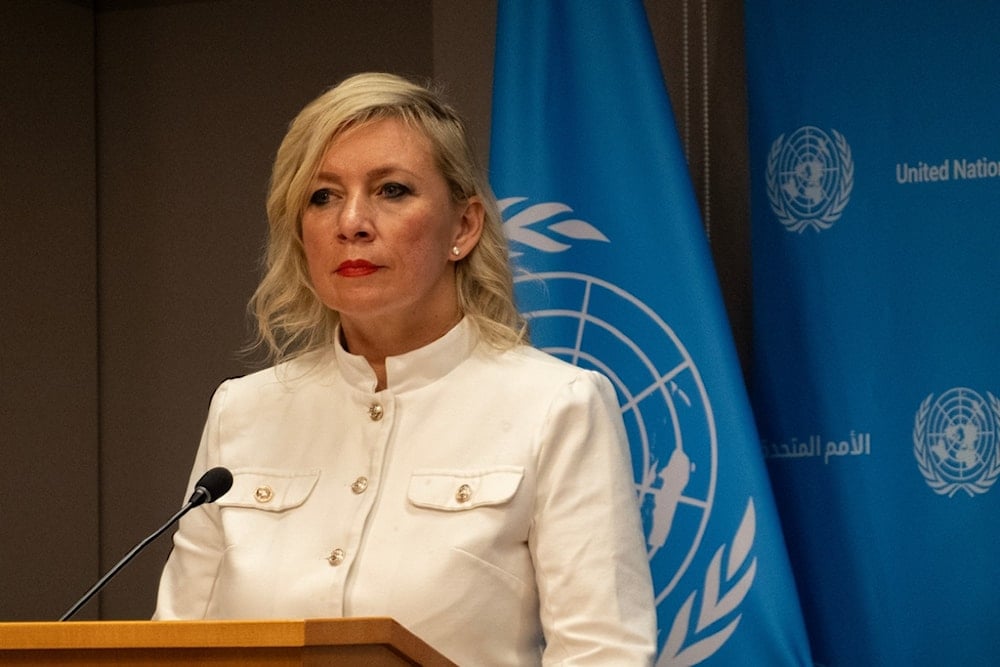Russia slams efforts to revive Iran sanctions via snapback mechanism
Russia denounced the E3's efforts to reimpose sanctions on Iran through the snapback mechanism, with Maria Zakharova accusing Western states of “cheating” and violating Security Council Resolution 2231.
-

Russian Foreign Ministry spokesperson Maria Zakharova at a news conference at UN headquarters during the 80th session of the United Nations General Assembly, Saturday, September 27, 2025. (AP Photo/Ted Shaffrey)
Russia’s Foreign Ministry spokesperson Maria Zakharova strongly denounced attempts by the United Kingdom, France, and Germany (E3) to reinstate sanctions on Iran. Moscow accused the three states of abusing the snapback mechanism under the Joint Comprehensive Plan of Action (JCPOA) and acting outside international law.
“From the point of view of international law, it looks like cheating: if you break the rules yourself, you lose the right to use the mechanisms prescribed in them,” she said on her Telegram channel.
The dispute followed a Friday vote at the United Nations, where the US and its allies blocked a Russia–China draft resolution that sought to delay the sanctions for six months.
Zakharova argued that disputes should first go through the JCPOA’s resolution mechanism before being taken to the Security Council. She added that Western states had long failed to uphold their obligations under the deal and were now resorting to “legal tricks sewn with white threads” to punish Iran.
Read more: Araghchi rejects US, E3 attempts to revive expired Iran sanctions
Lavrov: West derailing diplomatic efforts on Iran
Separately, on Saturday, Russia's Foreign Minister Sergei Lavrov stated that Western nations are making attempts to derail diplomatic efforts on Iran's nuclear program, stating that the rejection of a joint proposal by Moscow and Beijing to extend the 2015 agreement made clear the deliberate campaign to maintain pressure on Tehran
"Yesterday, at the Security Council, the West rejected a rational proposal by China and Russia to extend the 2015 agreement on Iran's nuclear program to buy time for diplomacy. This has finally exposed the West's strategy of sabotaging the search for constructive solutions in the UN Security Council and its desire to extract unilateral concessions from Tehran by blackmail and pressure," Lavrov said during his address at the 80th session of the UN General Assembly.
The snapback mechanism was included in the 2015 JCPOA and Security Council Resolution 2231 as a way to quickly restore sanctions if Iran was deemed non-compliant. The JCPOA had initially lifted UN and Western restrictions tied to Iran’s peaceful nuclear program.
With the deal’s formal termination, sanctions on Tehran are now scheduled to be reimposed, affecting energy exports, banking, shipping, and access to international financial systems.
Russia, China, and Iran’s response
Both Russia and China, permanent members of the Security Council, have rejected the reimposition of sanctions, calling the E3 move illegal and destabilizing. Tehran has also refused to recognize the legitimacy of the process but has not ruled out dialogue with the European trio.
Moscow maintains that the snapback mechanism cannot be applied when the parties invoking it have already violated the JCPOA and Resolution 2231.
The JCPOA was undermined in 2018 when then US President Donald Trump unilaterally withdrew from the agreement and reinstated anti-Iran sanctions. Following Washington’s exit, the E3 also scaled back their commitments, halting trade with Tehran.
On August 28, the E3 launched their latest attempt to activate the snapback mechanism, while Iran continued limited engagement with the International Atomic Energy Agency (IAEA). Despite attacks against Iranian nuclear facilities in June, Tehran signed a framework deal with the IAEA on September 9 to resume cooperation.
Read more: Ghalibaf calls Snapback Mechanism illegal, warns of reciprocal actions

 3 Min Read
3 Min Read








